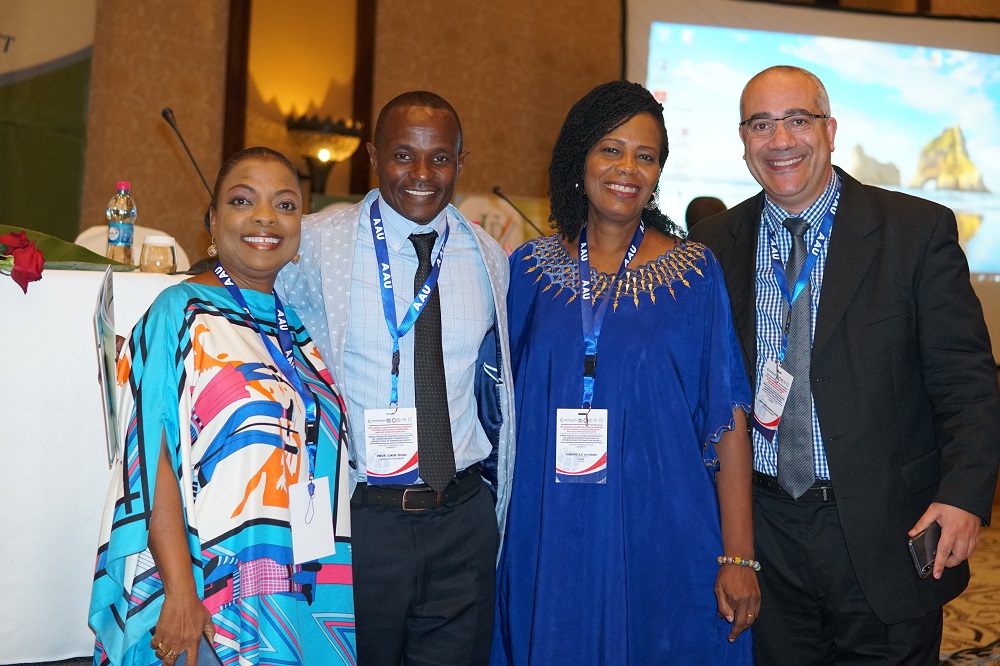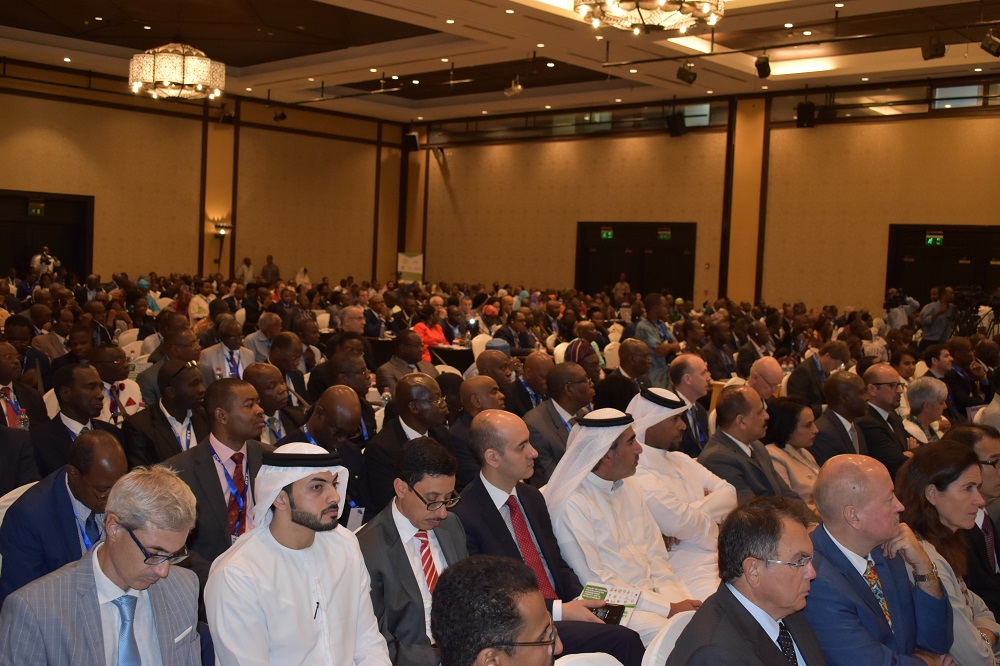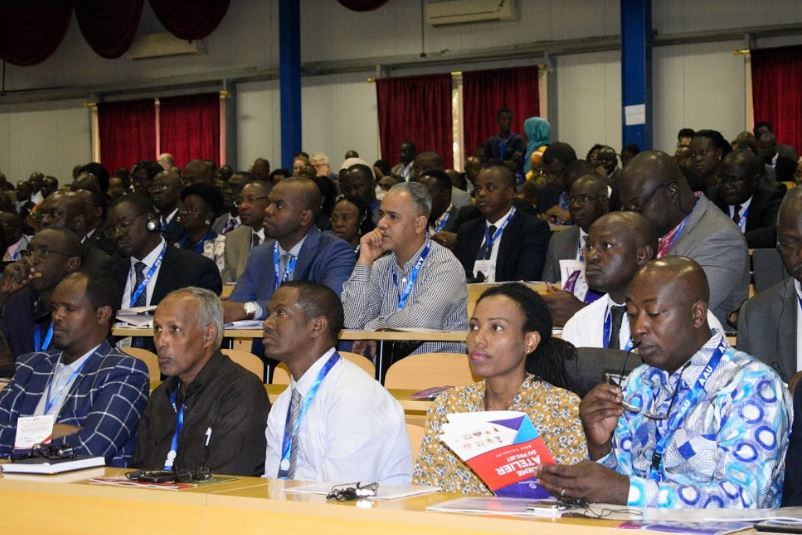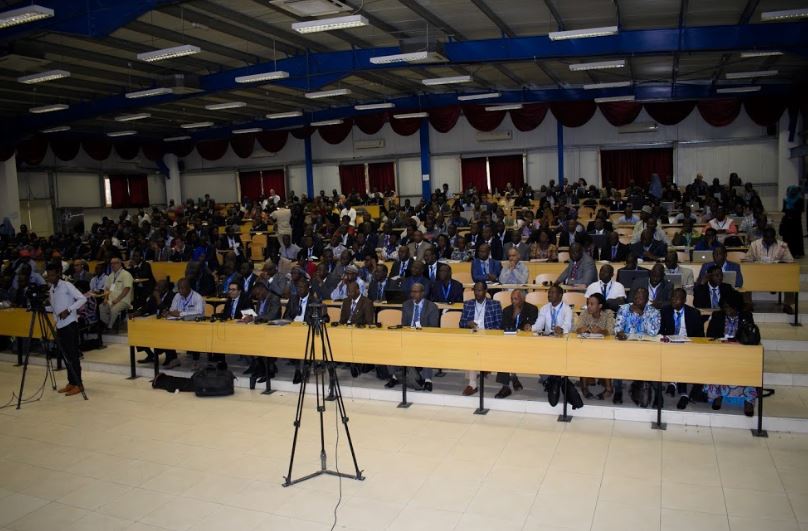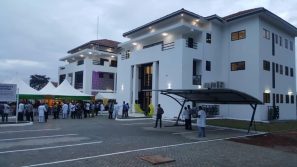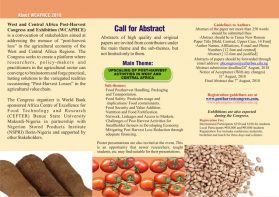| S/NO. |
PROJECT TITLE |
LEAD INSTITUTION |
COUNTRY |
TOPIC |
DISCIPLINE |
| EXISTING CENTRES OF EXCELLENCE THAT HAVE BEEN CONDITIONALLY SELECTED FOR RENEWAL |
| 1 |
CEA EN SCIENCES MATHEMATIQUES, INFORMATIQUE ET APPLICATIONS |
University of Abomey Calavi |
Benin |
Applied math & statistics |
STEM |
| 2 |
CEA POUR LA FORMATION ET LA RECHERCHE EN SCIENCES ET TECHNOLOGIES DE L’EAU, L’ENERGIE ET L’ENVIRONNEMENT EN AFRIQUE DE L’OUEST ET DU CENTRE (CEA-2IE) |
2iE |
Burkina Faso |
Water, energy and environment |
STEM |
| 3 |
CEA MINES ET ENVIRONNEMENT MINIER (CEA-MEM) |
INP-HB |
Cote d’Ivoire |
Mining |
STEM |
| 4 |
CEA CHANGEMENT CLIMATIQUE, BIODIVERSITE ET AGRICULTURE DURABLE (CEA-CCBAD) |
Université Félix Houphouët-Boigny |
Cote d’Ivoire |
Climate change |
Agriculture |
| 5 |
CEA: STATISTIQUE ET ECONOMIE QUANTITATIVE |
ENSEA |
Cote d’Ivoire |
Statistics & quantitative economics |
Soc./Econ Sci. |
| 6 |
REGIONAL WATER AND ENVIRONMENTAL SANITATION CENTRE KUMASI (RWESCK) |
KNUST |
Ghana |
Transport |
STEM |
| 7 |
WEST AFRICAN CENTRE FOR CELL BIOLOGY OF INFECTIOUS AND NON- COMMUNICABLE DISEASES (WACCBIP + NCDS) |
University of Ghana |
Ghana |
Cell biology of infectious e diseases |
Health |
| 8 |
WEST AFRICA CENTRE FOR CROP IMPROVEMENT (WACCI) |
University of Ghana |
Ghana |
Crop Improvement |
Agriculture |
| 9 |
ACE IN GENOMICS OF INFECTIOUS DISEASES (ACEGID) |
Redeemer’s University |
Nigeria |
Genomics of infectious diseases |
Health |
| 10 |
ACE FOR NEGLECTED TROPICAL DISEASES AND FORENSIC BIOTECHNOLOGY (ACENTDFB) |
Ahmadu Bello University |
Nigeria |
Neglected tropical diseases |
Health |
| 11 |
ACE FOR REPRODUCTIVE HEALTH INNOVATION (CERHI) |
University of Benin |
Nigeria |
Reproductive Health |
Health |
| 12 |
ACE IN DRY LAND AGRICULTURE (CDA) |
Bayero University, Kano |
Nigeria |
Dryland Agriculture |
Agriculture |
| 13 |
CENTRE FOR FOOD TECHNOLOGY AND RESEARCH (CEFTER) |
Benue State University |
Nigeria |
Food tech and research |
Agriculture |
| 14 |
ACE: OAU ICT-DRIVEN KNOWLEDGE PARK (OAU-OAK) |
OAU |
Nigeria |
Digital Development |
STEM |
| 15 |
CENTER FOR OILFIELD CHEMICALS RESEARCH (CEFOR) |
University of Port Harcourt |
Nigeria |
Oil and gas |
STEM |
| 16 |
CEA MATHÉ-MATIQUES, INFORMATIQUE ET TIC (CEA-MITIC) |
Univ. Gaston Berger |
Senegal |
Digital Development |
STEM |
| 17 |
CEA POUR LA SANTE DE LA MERE ET DE L’ENFANT (CEA-SAMEF) |
Université Cheikh Anta Diop |
Senegal |
Maternal & infant health |
Health |
| 18 |
CENTRE D’EXCELLENCE REGIONAL SUR LES SCIENCES AVIAIRES (CERSA) |
Université de Lomé |
Togo |
Poultry science |
Agriculture |
| NEW CENTRES OF EXCELLENCE THAT ARE CONDITIONALLY SELECTED |
| 19 |
CENTRE D’EXCELLENCE AFRICAIN POUR L’EAU ET L’ASSAINISSEMENT (C2EA) |
Université Abomey Calavi |
Benin |
Water & sanitation |
STEM |
| 20 |
CENTRE DE FORMATION, DE RECHERCHE ET D’EXPERTISES EN SCIENCES DU MEDICAMENT |
Université de Ouaga I |
Burkina Faso |
Pharmaceutical Science |
Health |
| 21 |
CEA ET INNOVATION BIOTECHNOLOGIQUES POUR L’ELIMINATION DES MALADIES A TRANS-MISSION VECTORIELLE (CEA/ITECH-MTV) |
Université Nazi Boni |
Burkina Faso |
Biotech for eliminating vector transmitted diseases |
Health |
| 22 |
ACE FOR POSTGRADUATE MEDICAL EDUCATION |
University of Buea |
Cameroon |
OBGYN -Medical education |
Health |
| 23 |
CEA: VALORISATION DES DECHETS EN PRODUITS A HAUTE VALEUR AJOUTEE (VALOPRO) |
INPHB |
CDI |
Waste management and value-added |
STEM |
| 24 |
REGIONAL TRANSPORT TRAINING AND RESEARCH CENTRE |
KNUST |
Ghana |
Transport |
STEM |
| 25 |
ACE:REGIONAL CENTER FOR ENERGY AND ENVIRONMENTAL SUSTAINABILITY (RCEES) |
University of Energy & Natural Resources |
Ghana |
Power |
STEM |
| 26 |
WEST AFRICAN CENTER FOR WATER, IRRIGATION AND SUSTAINABLE AGRICULTURE |
University of Development Studies |
Ghana |
Water & irrigation |
STEM |
| 27 |
AFRICA CENTRE OF EXCELLENCE IN COASTAL RESILIENCE (ACECoR) |
University of Cape Coast |
Ghana |
Coastal Degradation |
STEM |
| 28 |
WEST AFRICA GENETIC MEDICINE CENTRE |
University of Ghana |
Ghana |
Genetic medicine |
Health |
| 29 |
CENTRE D’EXCELLENCE AFRICAIN POUR LA PREVENTION ET LE CONTROLE DES MALADIES TRANSMISSIBLES (CEA PCMT) |
Université Gamal Abdel Nasser de Conakry |
Guinea |
Prevention & control of transmittable diseases |
Health |
| 30 |
CENTRE D’EXCELLENCE REGIONAL SUR LES PRODUCTIONS PASTORALES : VIANDE, LAIT, CUIRS ET PEAUX (CERPP) |
Université Abdou Moumouni |
Niger |
Livestock |
Agriculture |
| 31 |
AFRICA CENTRE OF EXCELLENCE ON TECHNOLOGY ENHANCED LEARNING (ACETEL) |
National open university of Nigeria |
Nigeria |
Digital Development |
STEM |
| 32 |
COVENANT APPLIED INFORMATICS AND COMMUNICATION |
Covenant University |
Nigeria |
Digital Development |
STEM |
| 33 |
ACE: AFRICA CENTRE OF EXCELLENCE ON NEW PEDAGOGY IN ENGINEERING EDUCATION (ACENPEE) |
Ahmadu Bello University |
Nigeria |
Engineering education |
STEM |
| 34 |
AFRICA CENTRE OF EXCELLENCE: PUBLIC HEALTH AND TOXICOLOGICAL RESEARCH |
University of Port Harcourt |
Nigeria |
Nursing |
Health |
| 35 |
ACE: CENTRE FOR POPULATION HEALTH AND POLICY |
Bayero University |
Nigeria |
Nursing |
Health |
| 36 |
AFRICAN CENTRE OF EXCELLENCE FOR MYCOTOXIN AND FOOD SAFETY |
Federal University of Technology Minna |
Nigeria |
Mycotoxin and food safety |
Health |
| 37 |
ACE: DRUG RESEARCH, HERBAL MEDICINE DEVELOPMENT AND REGULATORY SCIENCE |
University of Lagos |
Nigeria |
Herbal medicine and regulation |
Health |
| 38 |
CENTRE OF EXCELLENCE FOR INNOVATIVE AND TRANSFORMATIONS STEM EDUCATION (CITSE) |
Lagos State University |
Nigeria |
STEM Education |
Education |
| 39 |
ACE FOR SUSTAINABLE POWER ANS ENERGY DEVELOPMENT (ACE_SPED) |
University of Nigeria Nsukka |
Nigeria |
Power |
STEM |
| 40 |
CENTER OF EXCELLENCE IN FUTURE ENERGIES AND ELECTROCHEMICAL SYSTEMS |
Federal University of Technology Owerri |
Nigeria |
Renewable energy |
STEM |
| 41 |
CEA « AGIR » EN ENVIRONNEMENT ET SANTE |
Université Cheikh Anta Diop |
Senegal |
Env & Health |
STEM |
| 42 |
CEA AGRICULTURE POUR LA SECURITE ALIMENTAIRE ET NUTRITIONNELLE (CEA AGRISAN) |
Université Cheikh Anta Diop |
Senegal |
Food security & nutrition |
Agriculture |
| 43 |
CENTRE D’EXCELLENCE REGIONAL POUR LA MAITRISE DE L’ELECTRICITE (CERME) |
Universite de Lome |
Togo |
Power |
STEM |
| 44 |
CENTRE D’EXCELLENCE REGIONAL VILLES DURABLES EN AFRIQUE (DOUNEDON) |
Université de Lomé |
Togo |
Urban Design |
Soc./Econ Sci. |

